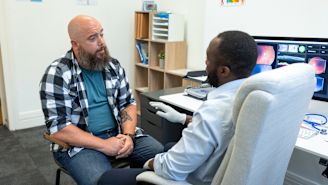Colon cancer is the third leading cause of cancer-related deaths in men and women, separately, in the United States, and the second most common cause of cancer deaths when men and women are combined. This disease is so often deadly because it’s frequently discovered after it’s already reached a late stage.
“Colon cancer is potentially very curable if we screen for it according to guidelines,” says Steven Goldin, MD, a surgical oncologist at Fawcett Memorial Hospital in Port Charlotte, Florida.
Here’s how to recognize the signs of colon cancer, when to book your next screening appointment, plus tips to lower your risk.
Symptoms of colon cancer
Colon cancer begins in the lower part of your intestine. “Most colon cancers, especially the smaller tumors [which is a solid mass of cancer cells], have no symptoms at all,” says Goldin. “People will be walking around with no idea that they have multiple tumors. Often, they don’t get tested until there’s not much that can be done to treat them.”
By the time symptoms are noticed, the disease has usually already spread outside of the colon. Yet, between 70 to 90 percent of colon cancers are diagnosed after symptoms appear because of the tendency to delay screening.
If symptoms are present, they may include:
- Black or tar-colored stools (poop), diarrhea
- Severe constipation or being completely unable to have a bowel movement
- Frequent gas pain or stomach aches
- Blood in your stool: “Anybody who's experiencing rectal bleeding [which may be noticed on toilet paper or in stool] should make an appointment with their healthcare provider (HCP). People might think, ‘Well, I've got hemorrhoids,’ but you could have colon cancer as well,” says Goldin.
Internal bleeding can also cause you to feel weak, exhausted or dizzy. If you’re experiencing any of these symptoms, make an appointment with your HCP immediately.
Colon cancer screening
If you’re at an average risk for colon cancer, you should begin screening at age 45. People who are at a higher risk should talk to their HCP by age 40 to determine an appropriate screening regimen for them, says Goldin. You’re at a higher risk for colon cancer and may need to start screening before age 45 if you:
- Have a history of inflammatory bowel disease, which causes chronic inflammation in the digestive tract
- Have a family history of colon cancer
- Have previously had radiation treatment to your abdomen or pelvic area
There are a number of tests available, but the gold standard, or preferred method, for colon cancer screening is the colonoscopy, explains Goldin. For a colonoscopy, a gastroenterologist, a doctor specializing in the stomach and intestines, passes a long tube with a light and camera at the end through your colon to search for polyps. Polyps are little growths on the colon lining, which may eventually grow into tumors.
If you have polyps, your gastroenterologist will remove samples (called a biopsy) and send them to a laboratory to determine if you have cancer. Your HCP may be able to completely remove polyps or even small tumors during the colonoscopy as well.
What can you expect during a colonoscopy?
The night before, you’ll need to complete a bowel preparation (bowel prep), which involves drinking a liquid medication that causes short-term diarrhea. The goal of bowel prep is to clean out your lower intestine so the lining of your colon is easier to see on camera. You may also need to avoid solid foods ahead of time. Most people are instructed to only consume clear liquids like chicken broth and Jell-O that is not red or dark in color the day before.
Right before your colonoscopy, you’ll be given a sedating medication, or a drug that will make you feel calm and sleepy. You may still be sleepy afterwards, so bring a friend or family member along to help you get home safely.
People at average risk for colon cancer usually need a coloscopy every ten years.
How colon cancer is treated
Biopsy results from most laboratories are usually available within two weeks, but many laboratories will notify you sooner. If your biopsy reveals that you have cancer, the treatment that you receive will depend on how more specific details about the type of cancer you have.
Small tumors may be completely removed during your initial colonoscopy. If it’s not possible to completely remove the cancer at that point, you may need surgery as well. Your surgeon will take samples of nearby lymph nodes (small bean-shaped organs that store white blood cells and filter substances as part of the immune system) during surgery to determine whether the cancer has spread outside of your colon.
If the cancer has reached your lymph nodes, chemotherapy may be recommended. Chemotherapy (chemo) is a type of medication that goes throughout your body and kills cancer cells that may be left behind after surgery. Chemo for colon cancer typically involves intravenous medication that’s given in a series of doses directly into your blood stream, and spread out over about six months.
Ways to lower your risk for colon cancer
There’s no guaranteed way to prevent colon cancer, but there are a few lifestyle changes that can help lower your risk:
- Quit smoking: If you smoke, quitting tobacco is one of the most important things you can do to prevent cancer and improve your overall health. Talk to your HCP about quitting, and how your insurance may help cover costs.
- Eat less red meat: “There’s growing evidence that red meat and smoked foods, which have been processed with preservatives called nitrites, can increase your risk for colon cancer,” says Goldin. Set a goal to cook a few vegetarian meals each week. Add legumes like beans, lentils and chickpeas to dishes instead of meat to help you feel full and satisfied.
- Get enough exercise: As you are able, aim for 150 minutes of moderate exercise like brisk walking or 75 minutes of vigorous exercise like jogging or swimming each week. Keeping the weight off—especially around your midsection—has been shown to reduce colon cancer risk.
The most important thing you can do to avoid a late-stage colon cancer diagnosis is to follow routine screening guidelines.
“Think about the costs of treatment, the worry and everything you’d go through with a colon cancer diagnosis,” says Goldin. “If you detect polyps early and remove them before they become cancer, you can prevent a great deal of pain and worry.”






